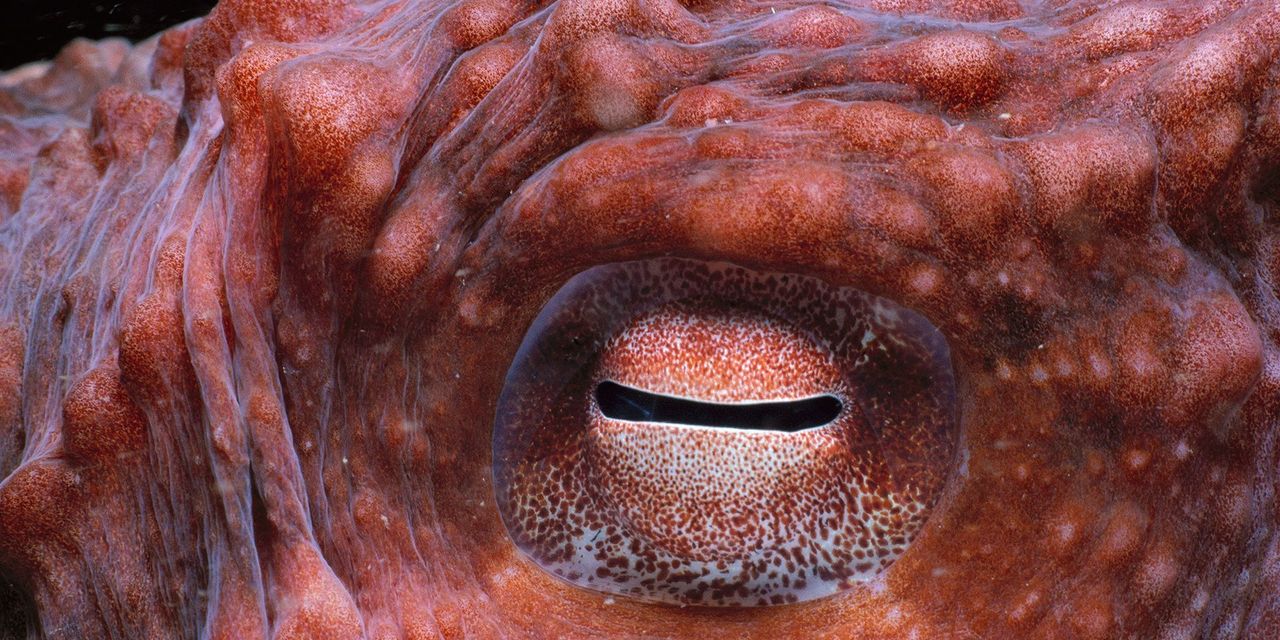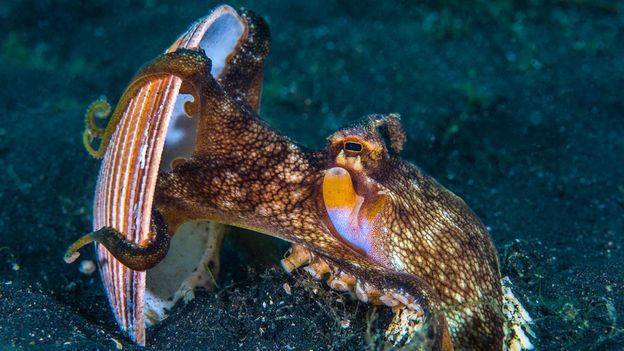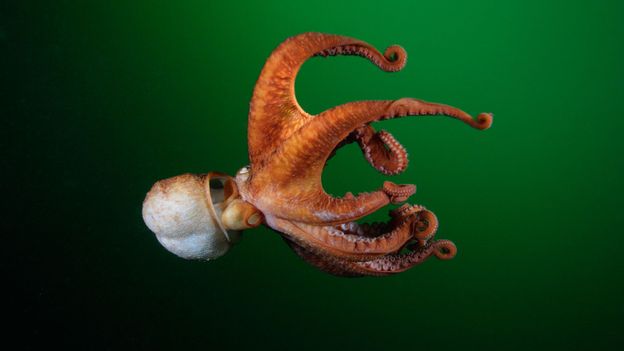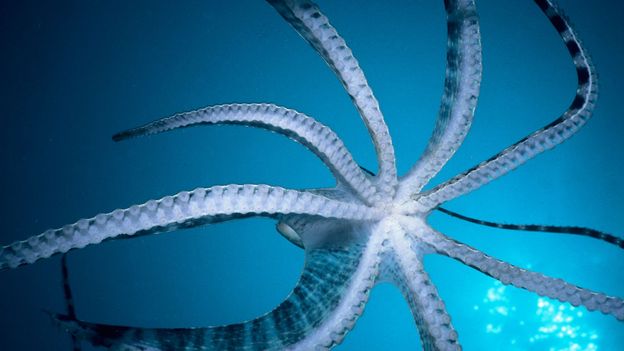I found this article on the BBC Earth Webpage and wanted to share it!

Here are eight reasons why octopuses are the geniuses of the ocean.
In 2007 I was snorkelling in Dahab, Egypt, when I came face-to-face with a common octopus.
It was an intense experience. I felt it was sizing me up, and there was an ill-defined but somehow profound communication. Our meeting only lasted a few seconds, but I was left with an enduring impression of having encountered a great intelligence.
The experience may help explain the loud cheer I let out in April 2016, when I heard the news of Inky the octopus's great escape from the National Aquarium of New Zealand. The lid of Inky's tank was left ajar at night, and he took advantage of this by climbing out, walking across a room to a drain opening, and squeezing down a 160ft (50m) pipe to the open ocean.
His successful bid for freedom was one more piece of evidence that octopuses are some of the most intelligent creatures on Earth. Here are eight of our favourite octopus behaviours that illustrate just how smart these cephalopods really are.
Intelligent design
Jennifer Mather is a comparative psychologist at the University of Lethbridge in Canada. She has been studying octopuses since 1972. One encounter, during field work in Bermuda in 1984, suggested to her that they were more intelligent than they were being given credit for.
Here was an animal with a mental image of what it wanted
Mather had watched a common octopus catch some crabs and take them back to its shelter to eat. Then it suddenly darted towards a rock about 7ft (2m) away, put it under its tentacles and took it back to its den. The octopus did this three more times, creating a wall in front of its home. As if confident in the extra security measure, it then fell asleep behind the barrier.
Mather argues that this and other examples are evidence that octopuses are capable of foresight and sequencing of actions.
"This demonstrated to me that here was an animal with a mental image of what it wanted and one that was capable of planning," says Mather. "It was very far removed from the automatic stimulus-response that we were used to thinking about with animals."

A veined octopus (Amphioctopus marginatus) lifting a shell (Credit: Alex Mustard/naturepl.com)
Tooled up
Mather and her colleagues have argued that using stones to build walls could count as tool use. However others disagree, arguing that the octopuses could be acting in an instinctive rather than a calculated manner.
Then along came the veined octopuses. In 2009, Julian Finn and colleagues at the Museum Victoria in Melbourne, Australia found hard evidence that they used tools.
Play has often been seen as the preserve of animals with higher cognitive abilities
The octopuses were digging up discarded coconut shells from the ocean floor, cleaning them with water jets, sometimes stacking them and carrying them up to 66ft (20m) to later reassemble as a shelter.
The octopuses were filmed arranging the half-shells with the pointed ends facing down, then extending their arms over them and walking in a comic fashion along the sea floor.
Finn pointed out that this was a slow, awkward and energy-inefficient form of movement, which made them more vulnerable to predators. He argues that the octopuses' willingness to accept these risks, in exchange for protection in the future, is conclusive evidence of genuine tool use.

A giant Pacific octopus (Enteroctopus dofleini) (Credit: Brandon Cole/naturepl.com)
Bend it like Inky
Play has often been seen as the preserve of animals with higher cognitive abilities. It is hard to precisely define it, but in broad terms play is activity that does not serve an immediately useful function other than enjoyment.
After learning about the work of Lethbridge University colleague Sergio Pellis on mammalian play, Mather wondered whether octopuses play. Working with Seattle Aquarium biologist Roland Anderson, who died in 2014, she devised an experiment.
Roland phoned me and said 'he's bouncing the ball'
They placed eight giant Pacific octopuses in bare tanks, and over 10 trials gave them floating plastic pill bottles to investigate. At first the octopuses all put the bottles to their mouths, apparently to see if they were edible, then discarded them.
However, after several trials, two of them began blowing jets of water at the bottles. The bottles were sent tumbling to the other side of their aquarium, in such a way that the existing current brought them back to the octopuses. The researchers, who published the study in 1999, argued that this was a form of exploratory play.
"Roland phoned me and said 'he's bouncing the ball'," says Mather.
She says the octopuses were playing with the bottles. This is similar to the way human children quickly start to play with unfamiliar objects, something psychologist Corinne Hutt highlighted several decades ago.
"If you have an octopus in any new situation, the first thing it does is it explores," says Mather. "I think it was Hutt who said children will go from 'what does this object do?' to 'what can I do with this object'. That's what these octopuses were doing."
Temperamentally tentacled
Mather and Anderson were happy to conclude that their octopuses were playing, even though only a couple of them did so. That was because they had previously shown that octopuses have personalities.
This means that individual octopuses behave in consistent ways, which differ from their fellows. This comes as no surprise to people who work with them. For example, octopuses kept in aquaria are often given names, which relate to how they respond to people.
Octopuses pass their personality traits onto their offspring
Mather and Anderson set out to measure these personality differences. They kept 44 East Pacific red octopuses in tanks. Every other day for two weeks, a researcher opened their tank lids and put their head close to the opening, touched the octopuses with a test tube brush, and offered them tasty crabs.
The researchers recorded 19 different responses. In a study published in 1993, they identified significant and consistent differences between individuals. For example, some of the octopuses would usually respond passively, while others tended to be inquisitive.
"People often talk about rainforests as complex environments, but the near-shore coral reef is much more so," says Mather. "The octopus has many potential predators and a huge array of potential food, and given their varied and varying environments it makes a great deal of sense that individuals do not fit precisely into the same niche."
In a follow-up study published in 2001, they found evidence that octopuses pass their personality traits onto their offspring. Given that they do not raise their young, this suggests their personalities are at least partly genetic.
Mather believes these variations in personality may underpin many of octopuses' advanced cognitive abilities, by allowing them to learn and adapt quickly.
It just shows that there are many other intelligent life forms that we share this planet with!
The blog song for today is: " Octopus´s Garden" by The Beatles. (of course)!!!
TTFN
Master of disguise
The evolutionary arms race has led animals to develop many devious ways to fool each other. There are grass snakes that play dead to avoid being eaten, male fish that pretend to be female to boost their reproductive prospects, and birds that feign broken wings to lure predators away from vulnerable offspring.
When moving through open water, it mimics a lionfish
Yet of all of nature's charlatans, the mimic octopus must be a leading contender for the title of "master of disguise".
Other octopuses can change the colour and texture of their skin to give predators the slip. The mimic is the only octopus that has been observed impersonating other animals. It can change its shape, movement and behaviour to impersonate at least 15 different species.
When travelling across sand, it can flatten its arms against its body and undulate like a venomous banded sole. When moving through open water, it mimics a lionfish, which is also venomous. Another trick is to put six of its arms into a hole and use the remaining two to look like a banded sea krait, a type of sea snake that is, of course, venomous.
A problem solved
Octopuses can use trial and error to find the best way to get what they want.
They have different strategies to achieve the same ends
In work published in 2007, Mather and Anderson observed giant Pacific octopuses trying to get at the meat in different types of shellfish. They simply broke open fragile mussels, pulled apart stronger Manila clams, and used their tongue-like radulas to drill into very strong littleneck clams.
When given a choice of the three, the octopuses favoured the mussels, presumably because they required less effort to get a meal.
The researchers then tried to confuse their subjects by wiring Manila clams shut. However, the octopuses simply switched technique. Mather concluded that they could learn based on non-visual information.
"It told us that octopuses are problem-solvers," she says. "They have different strategies to achieve the same ends, and they will use whichever is easiest first."
Mazes for molluscs
During fieldwork in Bermuda, Mather observed octopuses returning to their dens after hunting trips without retracing their outgoing routes. They also visited different parts of their ranges one after another on subsequent hunts and days.
Most of the octopuses had learned to recognise which maze they were in.
In a study published in 1991, she concluded that octopuses have complex memory abilities. They can remember the values of known food locations, and information about places they have recently visited.
When animals use landmarks to help them navigate, they have to be understand the landmarks' relevance within their contexts. This ability, known as conditional discrimination, has traditionally been seen as a form of complex learning: something only backboned "vertebrates" can do.
In work published in 2007, Jean Boal of Millersville University in Pennsylvania placed California two-spot octopuses in two different mazes. In each case they had to travel from the middle of a brightly-lit tank to reach a dark den, an environment they preferred. To get there they had to avoid a false burrow, which was blocked by an upside-down glass jar.
After five trial runs, most of the octopuses had learned to recognise which maze they were in and immediately headed for the correct burrow. This, Boal concluded, meant octopuses do have conditional discrimination abilities.

A mimic octopus (Thaumoctopus mimicus) (Credit: Jeff Rotman/naturepl.com)
Similarly different
In many ways, octopuses' brains are rather like ours.
They have folded lobes, similar to those of vertebrate brains, which are thought to be a sign of complexity. What's more, the electrical patterns they generate are similar to those of mammals.
The last common ancestor of humans and octopuses lived a long time ago
Octopuses also have monocular vision, meaning they favour the vision from one eye over that from the other. This trait tends to arise in species where the two halves of the brain have different specialisations. It was originally considered uniquely human, and is associated with higher cognitive skills such as language.
Octopuses even store memories in a similar way to humans. They use a process called long-term potentiation, which strengthens the links between brain cells.
These similarities are startling. The last common ancestor of humans and octopuses lived a long time ago, probably quite early in the history of multicellular life, and was a simple animal. That means the similarities in brain structure have evolved independently.
Even more fascinating than the similarities, however, are the differences.
Octopus intelligence may be distributed over a network of neurons, a little bit like the internet
More than half of an octopus's 500 million nervous system cells are in their arms. That means the eight limbs can either act on their own or in coordination with each other.
Researchers who cut off an octopus's arm found that it recoiled when they pinched it, even after an hour detached from the rest of the octopus. Clearly, the arms can act independently to some extent.
While the human brain can be seen as a central controller, octopus intelligence may be distributed over a network of neurons, a little bit like the internet.
If this is true, the insights octopuses offer extend way beyond their advanced cognitive and escapology abilities. Inky and his relatives may force us to think in a new way about the nature of intelligence.



No comments:
Post a Comment